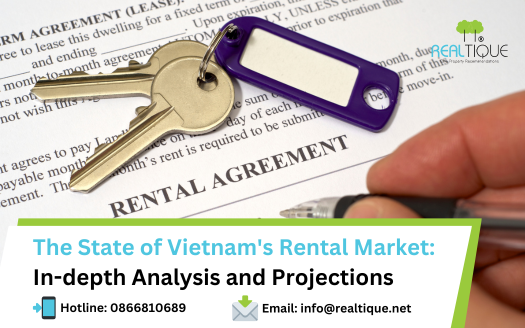The State of Vietnam’s Rental Market: In-depth Analysis and Projections
The State of Vietnam’s Rental Market: In-depth Analysis and Projections
The rental yield in Vietnam for residential market averagely was 8%, now it’s down to 5% and some cities can be around 3%…Why?
As you navigate through the intricate web of Vietnam’s rental market, it’s good to comprehend the urbanization, consumer preferences, and a multitude of factors shaping its landscape.
With a rapidly evolving economy and shifting demographics, the rental market in Vietnam has become a focal point for investors and analysts alike.
Market Overview
When analyzing Vietnam’s rental market, it’s crucial to understand the current state of the market through a comprehensive overview. This overview should encompass key factors such as rental prices, demand trends, and supply dynamics.
Rental prices in Vietnam vary significantly depending on the location, with major cities like Ho Chi Minh City and Hanoi commanding higher rates compared to smaller towns. Understanding these price variations is essential for both tenants and landlords to make informed decisions.
Moreover, examining demand trends is vital to gauge the market’s health. Factors such as population growth, urbanization, and economic development play a significant role in shaping rental demand. For instance, areas experiencing rapid urbanization and expats attraction are likely to see an increase in rental demand, presenting opportunities for property investors. For example: West of Hanoi like Nam Tu Liem District, West Lake are the expats attraction and in Ho Chi Minh City will be Thao Dien in District 2 or Thu Thiem.
Lastly, analyzing supply dynamics is crucial to assess the balance between supply and demand. An oversupply of rental properties can lead to lower occupancy rates and rental prices, impacting landlords’ profitability. Conversely, a shortage of rental units can drive up prices, potentially pricing out tenants. For instance, in Hanoi where high-end projects supply is few, the demand for this segment is much higher than in Ho Chi Minh City where the high-end projects supply is a little over.
Urbanization Impact
As urban areas continue to attract a growing number of residents seeking better economic opportunities and amenities, the demand for rental properties in Ho Chi Minh City and Hanoi is on the rise. Urbanization not only drives population growth but also influences the type of housing needed, with preferences shifting towards smaller, more affordable units in convenient locations.
The rapid pace of urbanization in Vietnam is reshaping the rental market landscape, leading to increased competition among landlords and property developers. This trend is driving landlords to offer more competitive rental rates and amenities to attract tenants in saturated urban markets. Additionally, urbanization is fueling the development of new residential complexes and mixed-use properties to cater to the diverse needs of the urban population. For instance, in Ho Chi Minh City, District 9 where is 40 minutes further away from center becomes attracting for a lot of tenants with budget from 500USD-700USD/month looking for 2 bedroom with a lot of decent amenities.
Consumer Preferences Shift
With consumer preferences in Vietnam’s rental market shifting towards modern amenities and flexible lease terms, landlords are adapting their offerings to meet these evolving demands. Tenants are increasingly prioritizing properties that come equipped with conveniences like high-speed internet, smart home features, and energy-efficient appliances. They value spaces that promote a healthy lifestyle, such as access to fitness centers, green spaces, and recreational areas within the rental complex.
Moreover, there’s a growing interest in flexible lease terms among renters. Many individuals are seeking shorter lease durations to accommodate their changing lifestyles and work arrangements. Landlords are responding by offering options like month-to-month leases or the ability to easily transfer to a different unit within the same property. However, the long term lease from 1 year is still the majority in the market. In Hanoi, there will be more flexibility in deposit. Owners usually accept 1 month deposit, whereas in Ho Chi Minh City, it will be 2 months.
In response to these preferences, project developers are investing in property upgrades and technology to enhance the increasing demands from landlords. By staying attuned to these shifting consumer preferences, landlords can attract and retain tenants in Vietnam’s competitive rental market.
Future Projections
Looking ahead, landlords in Vietnam’s rental market anticipate a surge in demand for eco-friendly properties with advanced technology integration. As sustainability becomes a growing concern among renters, properties with energy-efficient features such as solar panels, smart thermostats, and water-saving fixtures are expected to be highly sought after. Landlords who invest in eco-friendly upgrades may not only attract more tenants but also benefit from long-term cost savings on utilities.
Furthermore, the integration of advanced technology within rental properties is projected to be a key differentiator in the market. Smart home systems that allow tenants to control various aspects of their living space remotely are likely to appeal to tech-savvy renters. Features such as keyless entry systems, automated lighting, and security cameras can enhance convenience and security, making properties more desirable.
Conclusion
In conclusion, Vietnam’s rental market is experiencing significant growth due to urbanization and changing consumer preferences. Moving forward, opportunities for investment and development are plentiful, but challenges such as affordability and regulation must be addressed.
By staying informed and adapting to market trends, both landlords and tenants can navigate the evolving landscape of Vietnam’s rental market successfully.









